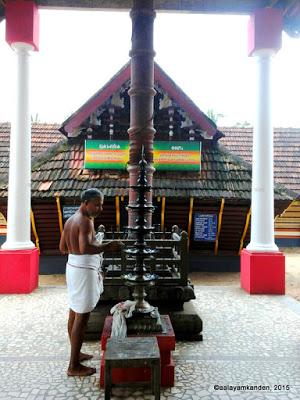
Dakshina Mookambiga temple at North Paravoor
The word Mookambiga immediately brings to mind Goddess Mookambigai of Kollur, in Udupi district of Karnataka. North Paravoor or Vadakkan Paravoor as it is called in Malayalam, is a town in Ernakulam district which has the Dakshina Mookambiga temple.
What is special about this temple and why is it called Dakshina Mookambiga?
The thampuran of Paravoor was a staunch devotee of Kollur Mookambigai. Every year, during Navaratri, he made it a point to visit his favorite goddess in order to offer prayers. Over time it became physically difficult for him to undertake the long journey to Kollur. He was heartbroken that he could not longer get a darshan of his favorite goddess. The goddess appeared in his dreams and asked him to build a temple for her near his palace. Based on her instructions, the Dakshina Mookambiga temple was built in the middle of a lotus pond and the Goddess Mookambigai was installed here in the form of Bala Parameswari..
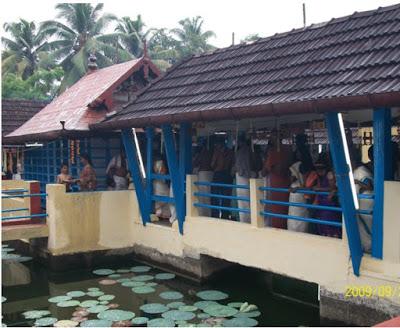
Dakshina Mookambigai temple at North Paravoor (photo courtesy: Dakshina Mookambiga temple)
The goddess holds a japamala and a veda manuscript and shows Abhaya Hasta. The temple is symbolically placed within the lotus pond. Just like how a lotus blooms when the sun shines, the brain will bloom and glow when the spiritual light is bestowed upon it in this temple.Devotees flock the temple to worship the goddess and offerings here to the Goddess are considered to be equivalent to offerings made at Kollur.
Mookambiga is a popular goddess in this part of the world and about fifty percent of the footfall in Kollur is from Kerala. This is the only Mookambiga temple in Kerala and comes under the Travancore Devasam Board. The poojas are carried out by the tantris of Tripunithura.
The presiding deity is worshipped as Saraswathi and during Navaratri, which is probably the largest festival at this temple, thousands flock here for Aksharabhyasam or Vidyarambam on Vijayadasami Day. This ritual symbolises the beginning of education for a child.
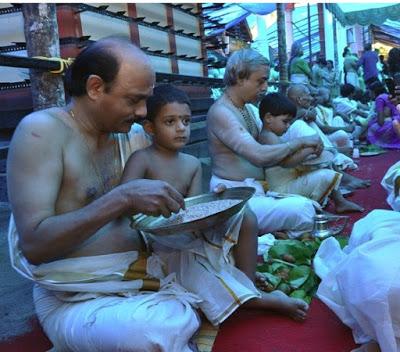
Vidyarambam at the North Paravoor temple (Photo Courtesy: Dakshina Mookambiga temple)
Children between the age of three and five years, sit before the gurus in the Saraswathy Mandapams, which are make shift tents that are created within the temple complex specifically for this purpose. The Gurus inscribe Harisree on the tongues of the children with gold rings and make them write Om on grains of paddy spread on a plate. Huge queues can be seen before the temple right from the middle of the night. The nada opens at 3 am in the morning after which the Poojayeduppu ceremony is performed.The Vidyarambam begins at 5.30 am and goes on until 2 pm in the afternoon. Prasadam is served to all the devotees in the mandapa facing the temple tank. In the nine days preceding Vijayadasami, several cultural programs take place in the temple, wherein several budding dancers and musicians make their arangetram (stage debut).
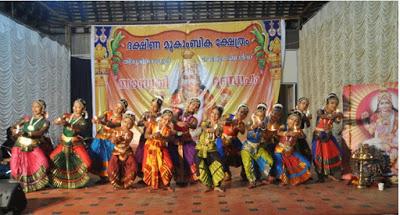
Children performing arangetram at North Paravoor temple (Photo Courtesy: Dakshina Mookambiga temple)
During the rest of the year too, this temple is considered as an important destination for students seeking enhancement in education. A special pooja termed Sree Vidhya Mantra Pushpanjali is performed here and Mookambiga Kashayam is offered to the students as prasadam. This mookambiga kashayam contains select herbs that enhance memory and wisdom. This is generally offered around 7.30 pm in the evening after the Aththazha pooja. Students can also perform Saraswathi puja or offer Chuttuvilakku at the temple to get better results in their examinations.Apart from this, a ten day annual festival is celebrated in the month of Makaram (January - February). Other than the presiding deity, there are also shrines for Ganapathi, the remover of hurdles, Muruga - the Gnana devatha, Vishnu, Hanuman, Veerabadra and Yakshi.
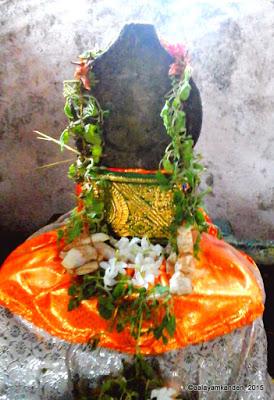
How to get here:
The temple is about 23 kms from Ernakulam. Take the Pipeline Road to Salem - Kochi - Kanyakumari Highway in Edapally for about five kms. Follow NH 17 to North Paravoor. Continue on Peruvaram Road once in North Paravoor. Turn left into Fort Road and then at Mookambiga Junction turn into Mookambiga Road. The temple can be found on the right. Map Coordinates : 10.146567, 76.232293
Temple Timings:
5 am to 11 am, 5 pm to 7.30 pm
Contact Details: 093870 45353
